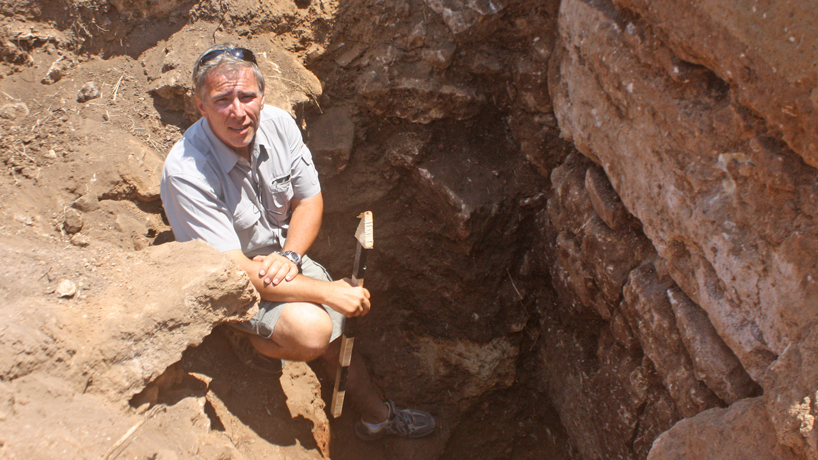
Michael Cosmopoulos began working at Iklaina, an archaeological site near Pylos, Greece, in 1999. During his time there, he has uncovered tax records and infrastructure that indicate it’s possibly the first federal state in the Western world. In recognition of that breakthrough, GREECE IS ranked Cosmopoulos’ work as one of the “Top 5 Greek Archaeological Discoveries of the Decade.” (Photo courtesy of Michael Cosmopoulos)
Until Michael Cosmopoulos looked closer, one of the most significant archeological discoveries of the decade appeared like nothing more than a clump of dirt.
“We nearly missed it,” said Cosmopoulos, the Hellenic Government-Karakas Foundation Professor of Greek Studies at the University of Missouri–St. Louis.
What lay beneath centuries of sediment was a tablet inscribed with Linear B, the earliest known form of Greek writing. It was unearthed at Iklaina, a Bronze Age palace and surrounding city-state, near Pylos, Greece.
During that era, Greece was home to several such palaces where tablets have been found. However, those sites mostly date to around 1,200 B.C., while Cosmopoulos’ 2011 discovery is several centuries older. That makes it the oldest Linear B tablet ever discovered in Greece, and its existence is evidence of an independent Iklaina – possibly the first federal state in the Western world. This subsequently challenged previous understandings of the formation of Mycenaean states.
In recognition of this breakthrough, GREECE IS, a magazine distributed with Greece’s leading newspaper, Kathimerini, ranked Cosmopoulos’ work at Iklaina as one of the “Top 5 Greek Archaeological Discoveries of the Decade.” Outlets such as CNN Greece and National Geographic also covered the discovery.
“It’s important because at that time, clay tablets were used exclusively as state records – specifically tax records,” Cosmopoulos said. “So, by definition, this clay tablet means state bureaucracy. The reason it’s so important is that it’s the earliest such state bureaucracy record that we have in the Western world. It dates to about 1,400 B.C. This pushes back the creation of states by several centuries.”
Cosmopoulos began working at Iklaina in 1999 and has spent time at the site every summer since then. Typically, his team includes 20 to 70 students – many from UMSL but some from international universities – and 15 to 20 staff members and specialists. Research began with a regional survey of the surface, which confirmed it was the largest site in the area, and excavation started in 2006. The team found the tablet in 2011 during routine processing of finds from the dig.
“There was disbelief in the beginning because we didn’t really expect it,” Cosmopoulos said. “Nothing like this had ever been found before.”
The tablet is similar to tax records that have been found at other Greek archeological sites. One side contains a list of male names and corresponding numbers. Cosmopoulos noted that these records were kept in archives, meaning there are likely more waiting to be discovered.
The opposite side of the tablet contains something unique, though. There is a heading that translates to “manufactured products,” but the tablet is broken below it, making the list of goods unreadable.
“It’s one of the mysteries that we’re trying to solve at the site,” Cosmopoulos said.
Over the years, continued research at Iklaina has turned up other indicators of an early state.
“We have massive, monumental architecture and in archaeology, the more formal and monumental your architecture is the more organized and complex your government is,” he said.
Advanced infrastructure projects at the site such as administrative buildings, a central sewer system, paved roads, paved piazzas and a water distribution system point to a level of coordination and work force only possible through a centralized government – one that was likely a regional capital.
Cosmopoulos said this provides a valuable look into the process of state formation in the ancient world and also helps us reexamine current issues like government and tax systems.
“One of the things that we always impress on our students about archaeology and study of the past is that our world is not disconnected from other cultures in time and space,” he said. “We are part of the same cultural continuum. This extends anywhere from democracy to science to sports – you name it.”
Iklaina has already been studied for more than 20 years, but the site is so vast, Cosmopoulos expects it could be studied for another two decades. Part of the longevity of the project is due to successful grant funding from the likes of the National Endowment for the Humanities, the National Science Foundation and the National Geographic Society.
It’s been worth every minute and cent for Cosmopoulos and his students.
“I had several students who told me after the dig that they felt homesick for Greece,” he said. “They didn’t say they missed it. They said they felt homesick. To me, this shows that they developed a deeper connection with a place and the culture.”














